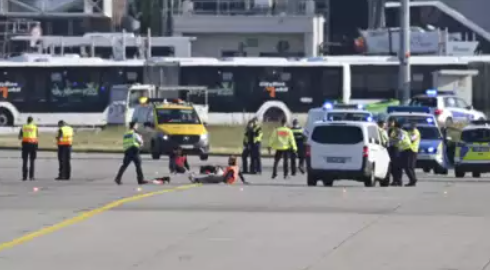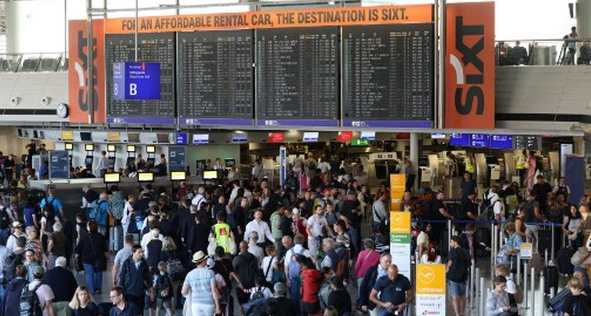Over 100 Flights Cancelled in Germany:-
Climate Protests Germany witnessed a significant disruption in air travel as over 100 flights were cancelled due to large-scale climate protests. Organized by environmental activist groups, these demonstrations aimed to bring attention to the urgent need for climate action and to protest the aviation industry’s role in contributing to greenhouse gas emissions. The protests, which took place at several major airports across the country, have sparked a nationwide conversation on the balance between environmental activism and public convenience.
TheClimate Protests : A Call for Action
The climate protests were spearheaded by a coalition of environmental organizations, including Extinction Rebellion and Fridays for Future. These groups have been vocal in their demands for more aggressive policies to combat climate change, emphasizing the need to reduce carbon emissions and transition to sustainable energy sources. The aviation industry, with its significant carbon footprint, has been a particular target of their activism.
TheClimate Protests were meticulously organized and involved thousands of participants. Demonstrators gathered at key airports, including Frankfurt, Munich, and Berlin Brandenburg, where they held sit-ins, blocked entrances, and staged marches. Their banners and chants called for immediate action to address the climate crisis and criticized the government’s perceived inaction.
Greta Thunberg, the young Swedish climate activist and a leading figure in the Fridays for Future movement, expressed her support for the protests on social media. “Our planet is burning, and we cannot wait any longer. The aviation industry must be held accountable for its emissions. Solidarity with everyone protesting for our future today in Germany,” she tweeted.  for more information click on this link
for more information click on this link
Impact on Air Travel
The Climate Protests led to significant disruptions in air travel. Over 100 flights were cancelled, and many more were delayed as airports struggled to manage the influx of demonstrators and the resulting operational challenges. Passengers faced long waits, rebookings, and general chaos as airlines and airport authorities worked to restore order and accommodate affected travelers.
Frankfurt Airport, one of Europe’s busiest hubs, was particularly hard-hit. Airport officials reported that dozens of flights were cancelled and several terminals were temporarily closed due to safety concerns. “We are working diligently to minimize disruptions and ensure the safety of all passengers and staff. We understand the frustration this has caused and appreciate everyone’s patience,” an airport spokesperson said.
Passengers expressed a mix of frustration and support for the protests. “It’s inconvenient, but I understand why they’re doing it. Climate change is a serious issue, and sometimes drastic measures are needed to get the message across,” said Lars Becker, a traveler who was caught in the chaos at Munich Airport.
However, not all travelers were sympathetic. “I have an important business meeting, and now I might miss it because of this. There has to be a better way to protest without causing so much disruption,” complained Anna Müller, a passenger stranded in Berlin.
Government and Industry Responses
The Climate Protests German government and the aviation industry responded to the protests with a combination of condemnation and calls for dialogue. The Federal Minister of Transport, Volker Wissing, criticized the disruptive tactics used by the protesters but acknowledged the legitimacy of their concerns. “While we understand and share the urgency of addressing climate change, disrupting public services and inconveniencing travelers is not the right approach. We are committed to finding solutions that balance environmental sustainability with economic stability,” he stated.
The German Aviation Association (BDL) issued a statement emphasizing the steps already taken by the industry to reduce its environmental impact. “The aviation sector is committed to achieving climate goals. We have made significant investments in more fuel-efficient aircraft, sustainable aviation fuels, and operational improvements to reduce emissions. Collaboration, not confrontation, is the way forward,” the statement read.
Environmental groups, however, argued that these measures are insufficient. “Incremental changes are not enough. We need a radical overhaul of the aviation industry and our entire approach to transportation if we are to meet the targets set by the Paris Agreement,” said Luisa Neubauer, a prominent Fridays for Future activist in Germany.
Broader Implications for Climate Activism
The scale and impact of the Climate Protests have reignited debates about the most effective strategies for climate activism. While disruptive actions can draw significant attention to urgent issues, they also risk alienating the public and provoking backlash. Balancing the need for urgent action with maintaining public support is a delicate challenge for environmental movements.
Experts in Climate Protests policy and social movements offered varied perspectives on the protests. Dr. Klaus Zimmermann, a sociologist at the University of Leipzig, noted, “Disruptive protests can be a powerful tool for social change, but they must be carefully managed to avoid undermining public sympathy. The key is to pair disruption with clear, achievable demands and constructive engagement with policymakers.”
The Climate Protests also highlight the broader societal challenges in transitioning to a low-carbon future. The aviation industry, like many other sectors, faces significant hurdles in reducing its carbon footprint while meeting the demands of global travel and commerce. Innovations such as sustainable aviation fuels, electric planes, and carbon offset programs are still in development and not yet widely implemented.  for more information click on this link
for more information click on this link
Looking Ahead: The Path to Sustainable Aviation
The Climate Protests events in Germany underscore the urgency of addressing the environmental impact of aviation. As the world grapples with the realities of climate change, the aviation industry must accelerate its efforts to reduce emissions and embrace sustainable practices. This will require concerted action from governments, industry leaders, and consumers alike.
Several key steps can be taken to move towards more sustainable aviation:
- Investment in Sustainable Aviation Fuels: Developing and scaling up the use of sustainable aviation fuels (SAFs) is crucial. These fuels, made from renewable sources, can significantly reduce the carbon footprint of air travel.
- Innovation in Aircraft Technology: Continued research and development into more fuel-efficient and potentially electric aircraft will be essential. Advances in aerodynamics, materials, and propulsion systems can lead to significant emissions reductions.
- Improved Air Traffic Management: Enhancing air traffic management systems to optimize flight paths and reduce fuel consumption can also contribute to lower emissions. This includes implementing next-generation air traffic control technologies.
- Carbon Offsetting Programs: While not a long-term solution, carbon offsetting can help mitigate the impact of aviation emissions in the short term. Airlines and passengers can invest in projects that remove or reduce carbon from the atmosphere.
- Policy and Regulatory Support: Governments must play a role in creating a favorable regulatory environment for sustainable aviation. This includes setting ambitious emissions targets, providing incentives for green technologies, and investing in research and infrastructure.
- Consumer Awareness and Behavior: Passengers can also make a difference by choosing airlines that prioritize sustainability, supporting carbon offset programs, and being mindful of their travel frequency and choices.
Conclusion
The climate protests in Germany and the resulting flight cancellations have brought the issue of aviation’s environmental impact to the forefront of public discourse. While the disruptions caused frustration for many travelers, they also served as a powerful reminder of the urgency of the climate crisis and the need for bold action.
As the Climate Protests world moves towards a more sustainable future, finding the right balance between activism and practical solutions will be key. The aviation industry, governments, and society at large must work together to address the challenges of climate change and ensure a viable and sustainable future for air travel. The events in Germany are a call to action, highlighting the need for immediate and concerted efforts to protect our planet for future generations ALSO READ:- Death Toll from Ethiopia Landslide Hits 257, Could Reach 500, Says UN 2024




